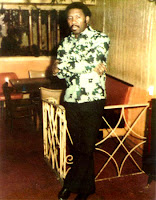James & Bobby Purify - So Many Reasons (Bell 648)

So Many Reasons
I'd like to start out here by talking a little bit about one of the most colorful characters to emerge from the southern soul scene, Papa Ding-Dong Diddley Daddy Debatably Daring Dig’in Out Dash’n Dip Dig’in Don Schroeder.
 A native of Pensacola, Florida, Don was working summers as a lifeguard at a posh resort called Castle Park up in Michigan (go figure). He occupied his time writing songs on his guitar, and playing them for the gaggle of girls that hung around his chair. Harry Smart, a rich Chicago businessman that was staying there, heard him, and was duly impressed. He called one of his friends back in the Windy City, one Ewart Abner, then vice-president of Vee-Jay Records. Arrangements were made for him to come to Chicago and audition.
A native of Pensacola, Florida, Don was working summers as a lifeguard at a posh resort called Castle Park up in Michigan (go figure). He occupied his time writing songs on his guitar, and playing them for the gaggle of girls that hung around his chair. Harry Smart, a rich Chicago businessman that was staying there, heard him, and was duly impressed. He called one of his friends back in the Windy City, one Ewart Abner, then vice-president of Vee-Jay Records. Arrangements were made for him to come to Chicago and audition. Abner was impressed as well, and had the young Schroeder in the studio with legendary producer Calvin Carter the next day. Melanie, one of those typical fifties 'I'm a teen in love' songs, was released by the company in 1959, making him the first white guy to record for the label. The record didn't do much, but Don just fell in love with the whole idea of making records, wanting more than anything to become a producer himself someday.
Abner was impressed as well, and had the young Schroeder in the studio with legendary producer Calvin Carter the next day. Melanie, one of those typical fifties 'I'm a teen in love' songs, was released by the company in 1959, making him the first white guy to record for the label. The record didn't do much, but Don just fell in love with the whole idea of making records, wanting more than anything to become a producer himself someday.After working with Gary S. Paxton as one of the Hollywood Argyles, Schroeder found himself attending the University Of Tennessee. He took his record to the local radio station, WATE, and they were all over it, eventually giving him his start as a promoter and a dee-jay with his own popular show.
 The big time, it seemed, was only a two hour drive away, and before long 'Papa Don' (as he was already known) gravitated to Nashville. He began working with our man John R, who became his manager, and was instrumental in getting him a deal with Phillips Records, where he'd release a couple of singles in 1962. The following year, he would sign with Fred Foster's new Monument subsidiary, Sound Stage 7, for a one-off release. None of these records would make the charts.
The big time, it seemed, was only a two hour drive away, and before long 'Papa Don' (as he was already known) gravitated to Nashville. He began working with our man John R, who became his manager, and was instrumental in getting him a deal with Phillips Records, where he'd release a couple of singles in 1962. The following year, he would sign with Fred Foster's new Monument subsidiary, Sound Stage 7, for a one-off release. None of these records would make the charts. Radio was in his blood, however, and before long he was broadcasting his unique 'shtick' over Nashville's #1 station, WKDA. He continued writing songs, and began producing demos of them down in Muscle Shoals, just another two hour drive away.
Radio was in his blood, however, and before long he was broadcasting his unique 'shtick' over Nashville's #1 station, WKDA. He continued writing songs, and began producing demos of them down in Muscle Shoals, just another two hour drive away. He brought some of those tapes to Jim Denny, who owned the blockbuster Cedarwood Publishing Company, and he hired him as a staff songwriter on the spot. Working with folks like Mel Tillis and Wayne Walker, he brought his own 'pop' perspective to the Country music they were writing. He would go on to write #1 Country smash Those Wonderful Years for the flamboyant Webb Pierce (pictured), and things were looking pretty good.
He brought some of those tapes to Jim Denny, who owned the blockbuster Cedarwood Publishing Company, and he hired him as a staff songwriter on the spot. Working with folks like Mel Tillis and Wayne Walker, he brought his own 'pop' perspective to the Country music they were writing. He would go on to write #1 Country smash Those Wonderful Years for the flamboyant Webb Pierce (pictured), and things were looking pretty good. The only problem was that Don "just hated" Nashville. Tired of playing the game, he headed home to Pensacola. Now a big fish in that relatively small pond, Papa Don became a huge local celebrity, with his popular WBSR radio show garnering an unheard of 78 share of the market. At a time when very few others were doing it, Papa was playing R&B that was aimed at a white audience. Like John R back in Music City, his sense of what made a good record kept people, both black and white, tuning in every day. He branched out into promotion, booking top-name R&B acts as they swung through 'the panhandle', and eventually opened up his own club.
The only problem was that Don "just hated" Nashville. Tired of playing the game, he headed home to Pensacola. Now a big fish in that relatively small pond, Papa Don became a huge local celebrity, with his popular WBSR radio show garnering an unheard of 78 share of the market. At a time when very few others were doing it, Papa was playing R&B that was aimed at a white audience. Like John R back in Music City, his sense of what made a good record kept people, both black and white, tuning in every day. He branched out into promotion, booking top-name R&B acts as they swung through 'the panhandle', and eventually opened up his own club.  Keeping his finger on the pulse of what was happening, Papa Don first heard a Louisiana kid named Sam McClain perform at the foremost 'black' venue in town, Abe's 506 Club. He was amazed by his voice, and talked Sam into going with him to Muscle Shoals so he could produce a record on him. Cutting a cover of Don Gibson's Sweet Dreams at Fame over the course of a weekend, he brought the tapes to Nashville to shop them around. It was there that he was introduced to New York record man Larry Uttal.
Keeping his finger on the pulse of what was happening, Papa Don first heard a Louisiana kid named Sam McClain perform at the foremost 'black' venue in town, Abe's 506 Club. He was amazed by his voice, and talked Sam into going with him to Muscle Shoals so he could produce a record on him. Cutting a cover of Don Gibson's Sweet Dreams at Fame over the course of a weekend, he brought the tapes to Nashville to shop them around. It was there that he was introduced to New York record man Larry Uttal. 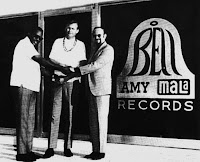 Uttal (shown here with Papa Don and the man who would become his partner, Moses Dillard) had already made his move into the southern R&B market by then, and (as we've seen) was already distributing both Sansu and Goldwax products on his Bell family of labels. He loved the record, and (to Jerry Wexler's eternal regret) entered into a 'handshake deal' with Schroeder to release it (under the name of 'Mighty Sam'), and to handle all future 'Papa Don Enterprises' productions. Although that first release didn't do much (for various reasons that we'll talk about in an upcoming post), it would turn out to be a pretty good deal for all involved.
Uttal (shown here with Papa Don and the man who would become his partner, Moses Dillard) had already made his move into the southern R&B market by then, and (as we've seen) was already distributing both Sansu and Goldwax products on his Bell family of labels. He loved the record, and (to Jerry Wexler's eternal regret) entered into a 'handshake deal' with Schroeder to release it (under the name of 'Mighty Sam'), and to handle all future 'Papa Don Enterprises' productions. Although that first release didn't do much (for various reasons that we'll talk about in an upcoming post), it would turn out to be a pretty good deal for all involved. 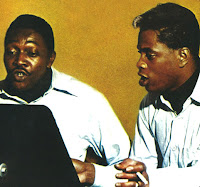 Back in Pensacola, Mighty Sam took Papa Don to a joint called Tom's Tavern to see an Alabama group he had performed with off and on, The Dothan Sextet. Tearing into high energy covers of the latest soul hits, they just brought down the house. Schroeder was once again enthralled with the voices of both their lead singer, James Purify, and their guitar player, Robert Dickey. Empowered by his new deal with Bell, he arranged for them to accompany him back to Fame, where he planned on producing sides on both of them. He brought along a keyboard guy who had been playing in his club by the name of Barry Beckett.
Back in Pensacola, Mighty Sam took Papa Don to a joint called Tom's Tavern to see an Alabama group he had performed with off and on, The Dothan Sextet. Tearing into high energy covers of the latest soul hits, they just brought down the house. Schroeder was once again enthralled with the voices of both their lead singer, James Purify, and their guitar player, Robert Dickey. Empowered by his new deal with Bell, he arranged for them to accompany him back to Fame, where he planned on producing sides on both of them. He brought along a keyboard guy who had been playing in his club by the name of Barry Beckett. When they got there, Schroeder realized that they didn't have any material, and locked himself in an upstairs office, listening to demos on a small tape recorder. A few hours later, he emerged with a song that he thought could work. Written by Fame's own Dan Penn and Spooner Oldham, it had been released as a single by Penn (MGM 13415) the year before, and had sunk without a trace. Papa Don heard something in the song that apparently nobody else in the room did, and they began working on it.
When they got there, Schroeder realized that they didn't have any material, and locked himself in an upstairs office, listening to demos on a small tape recorder. A few hours later, he emerged with a song that he thought could work. Written by Fame's own Dan Penn and Spooner Oldham, it had been released as a single by Penn (MGM 13415) the year before, and had sunk without a trace. Papa Don heard something in the song that apparently nobody else in the room did, and they began working on it.At this point, I'd like to quote from the excellent Bill Dahl interview of Schroeder that's been posted over at good ol' sundazed (which is where I found most of this information in the first place):
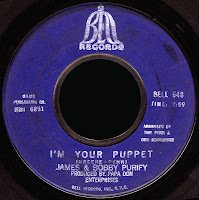 "I don’t think either one of ‘em liked the song... from the get-go, ‘cause it wasn’t R&B enough to suit either one of ‘em. And I said, ‘Guys, if you’ll just work with me on this, I’m telling you, I’m trying to cut us a hit record not just for the black market, I’m trying to cut a record that white people will love too... Dickey just couldn’t get it, man. He was trying so hard to sing the lead like I wanted... James Purify said, ‘Hey, man, here’s what he’s talking about.’ He started doing the lead. Wow! Then I said, ‘Dickey, you do the harmony.’ And we created James & Bobby Purify on the floor at... [the] studio. And they agreed to be a duet."
"I don’t think either one of ‘em liked the song... from the get-go, ‘cause it wasn’t R&B enough to suit either one of ‘em. And I said, ‘Guys, if you’ll just work with me on this, I’m telling you, I’m trying to cut us a hit record not just for the black market, I’m trying to cut a record that white people will love too... Dickey just couldn’t get it, man. He was trying so hard to sing the lead like I wanted... James Purify said, ‘Hey, man, here’s what he’s talking about.’ He started doing the lead. Wow! Then I said, ‘Dickey, you do the harmony.’ And we created James & Bobby Purify on the floor at... [the] studio. And they agreed to be a duet." Schroeder called Uttal in New York, and played him the song over the phone... "he said, 'What's the name of the act?' Well, I knew Robert Dickey... and Bobby’s a nickname for Robert. And Purify, I thought was the funkiest soulful name I ever heard in my life. I said, ‘Ba-ba-ba-ba-ba...’ And I named ‘em James & Bobby Purify on the telephone, talking to Larry Uttal. And Larry Uttal said, ‘Wow, what a name!’ I said, ‘Yeah, it is funky, man, isn’t it?'..." It sure was. Released in September of 1966, I'm Your Puppet would spend over four months on the charts, cruising to #5 R&B, and #6 Pop.
Schroeder called Uttal in New York, and played him the song over the phone... "he said, 'What's the name of the act?' Well, I knew Robert Dickey... and Bobby’s a nickname for Robert. And Purify, I thought was the funkiest soulful name I ever heard in my life. I said, ‘Ba-ba-ba-ba-ba...’ And I named ‘em James & Bobby Purify on the telephone, talking to Larry Uttal. And Larry Uttal said, ‘Wow, what a name!’ I said, ‘Yeah, it is funky, man, isn’t it?'..." It sure was. Released in September of 1966, I'm Your Puppet would spend over four months on the charts, cruising to #5 R&B, and #6 Pop.  Today's sweet selection was released as the B side of that timeless song. Another 'Oldham-Penn' jewel, it was recorded at the same session. Papa: "James Purify kept saying ‘folks aks me why instead of ask me why’ and I said, ‘James, it sounds great, but it’s not "aks," it’s "ask."’ ‘That’s what I said, man, aks!’ ‘All right, James, but try one more time for me. Let’s try it one more time.’ ‘Folks aks me why...’ Go listen to it! Oh, God, I went round and around with him on that. I finally said fine. 'Sounds like "ask" to me, man'..." I love it. All of this was going on around the same time that Atlantic was recording the Wicked Pickett at Fame, and was importing some Memphis musicians to work with him. In the interview, Papa Don says that he was "bringing Chips Moman down to play on my sessions..." as well. Anyway, I'm guessing that that breezy, high-up-in-the-mix guitar on here is being played by Moman himself. Cool, right?
Today's sweet selection was released as the B side of that timeless song. Another 'Oldham-Penn' jewel, it was recorded at the same session. Papa: "James Purify kept saying ‘folks aks me why instead of ask me why’ and I said, ‘James, it sounds great, but it’s not "aks," it’s "ask."’ ‘That’s what I said, man, aks!’ ‘All right, James, but try one more time for me. Let’s try it one more time.’ ‘Folks aks me why...’ Go listen to it! Oh, God, I went round and around with him on that. I finally said fine. 'Sounds like "ask" to me, man'..." I love it. All of this was going on around the same time that Atlantic was recording the Wicked Pickett at Fame, and was importing some Memphis musicians to work with him. In the interview, Papa Don says that he was "bringing Chips Moman down to play on my sessions..." as well. Anyway, I'm guessing that that breezy, high-up-in-the-mix guitar on here is being played by Moman himself. Cool, right? "Chips pulled me over... and he says, ‘Papa Don, I’m building this incredible studio in Memphis, and I want you to be the first record producer there. I mean it, man - I need you‘. I had a lot of respect for Chips Moman. He’s a talented guy. He said, ‘These guys in Muscle Shoals are great. But I’m telling you, Papa Don, I have found the best musicians in the world in Memphis… the best musicians I’ve ever worked with. Just try it - if you don’t like it, you ain’t gotta pay for it. The studio’s almost finished.’ I said, ‘Chips don’t call me ‘til that studio’s finished..." Soon after they recorded the follow-up record at Fame, top 40 hit Wish You Didn't Have To Go, Papa Don got that call, and switched his base of operations to American in Memphis.
"Chips pulled me over... and he says, ‘Papa Don, I’m building this incredible studio in Memphis, and I want you to be the first record producer there. I mean it, man - I need you‘. I had a lot of respect for Chips Moman. He’s a talented guy. He said, ‘These guys in Muscle Shoals are great. But I’m telling you, Papa Don, I have found the best musicians in the world in Memphis… the best musicians I’ve ever worked with. Just try it - if you don’t like it, you ain’t gotta pay for it. The studio’s almost finished.’ I said, ‘Chips don’t call me ‘til that studio’s finished..." Soon after they recorded the follow-up record at Fame, top 40 hit Wish You Didn't Have To Go, Papa Don got that call, and switched his base of operations to American in Memphis. James and Bobby's super-charged Shake A Tail Feather (Bell 669), a cover of a 1963 Five Du-Tones hit, was the first single to be recorded with Chips in Memphis. The incredible Reggie Young guitar over the whole 'party' atmosphere (overdubbed by Schroeder in New York with no less than Doris Troy and Melba Moore helping him out) sent the record to #15 R&B (#25 Pop) in May of 1967. Out in the public eye, they were right up there with Sam & Dave as one of the top 'duo' acts on the market. As a matter of fact, The Purifys own version of Sam & Dave's I Take What I Want, would actually outsell the original, and kept them in the top 40 all that summer.
James and Bobby's super-charged Shake A Tail Feather (Bell 669), a cover of a 1963 Five Du-Tones hit, was the first single to be recorded with Chips in Memphis. The incredible Reggie Young guitar over the whole 'party' atmosphere (overdubbed by Schroeder in New York with no less than Doris Troy and Melba Moore helping him out) sent the record to #15 R&B (#25 Pop) in May of 1967. Out in the public eye, they were right up there with Sam & Dave as one of the top 'duo' acts on the market. As a matter of fact, The Purifys own version of Sam & Dave's I Take What I Want, would actually outsell the original, and kept them in the top 40 all that summer. They would cut two LPs for Bell, one at Fame and one at American, both kind of hastily put together affairs, as albums often were in those days. Still, there's some great stuff on there, like covers of You Left The Water Running and You Don't Love Me, that make them worth seeking out. Papa Don's ear for a great song remained intact, and a single pulled from that second album, Let Love Come Between Us (written by Mighty Field Of Vision's own John Wyker), was a huge 'beach music' hit that fall, breaking into the top 25 Pop.
They would cut two LPs for Bell, one at Fame and one at American, both kind of hastily put together affairs, as albums often were in those days. Still, there's some great stuff on there, like covers of You Left The Water Running and You Don't Love Me, that make them worth seeking out. Papa Don's ear for a great song remained intact, and a single pulled from that second album, Let Love Come Between Us (written by Mighty Field Of Vision's own John Wyker), was a huge 'beach music' hit that fall, breaking into the top 25 Pop.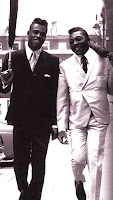 All of this fame and fortune was apparently taking its toll, as James Purify and Papa Don were increasingly 'not on the same page'. Difficult to work with at the best of times, James was now making it a habit of showing up late for sessions, and basically challenging the authority of his long-time producer. Schroeder was not a happy camper, and he let Larry Uttal know it.
All of this fame and fortune was apparently taking its toll, as James Purify and Papa Don were increasingly 'not on the same page'. Difficult to work with at the best of times, James was now making it a habit of showing up late for sessions, and basically challenging the authority of his long-time producer. Schroeder was not a happy camper, and he let Larry Uttal know it. At odds with Chips Moman as well, he consolidated his 'Papa Don Productions' company, and hired guitarist Moses Dillard as his right hand man. With Bell's blessing, they built their own studio down in Pensacola in 1968, and shifted their base of operations southward. Initially, Schroeder thought that many of the 'Memphis Boys' would join him in Florida, but somehow that never happened.
At odds with Chips Moman as well, he consolidated his 'Papa Don Productions' company, and hired guitarist Moses Dillard as his right hand man. With Bell's blessing, they built their own studio down in Pensacola in 1968, and shifted their base of operations southward. Initially, Schroeder thought that many of the 'Memphis Boys' would join him in Florida, but somehow that never happened. Things came to a head for Papa sometime in 1969. "...James was very difficult and he just took the fun out of it for me," he said, "I called Larry Uttal, I said, ‘Larry... I’m through with the Purifys - you go get me an act, or I promise you, I’m leaving.’ He said, ‘You can’t quit! We have a deal and we have to have product on these guys now!’ I said, ‘Larry, you ain’t the one putting up with James Purify! I’m telling you, I quit! I’m quitting the business!’ Man, Larry flew down to Pensacola the next day... I still can’t believe he wasn’t smart enough to be a little more flexible and understanding of the situation. ‘We have to have product on the Purifys!’ I said, ‘I will never go in the studio again with James Purify... He says, ‘No Purifys, no deal.’ I said, ‘Goodbye!’ I locked up my studio... I quit my deal with Larry Uttal and Bell Records over that and I have never regretted it." Shortly after that, James Purify and Robert Dickey went their separate ways.
Things came to a head for Papa sometime in 1969. "...James was very difficult and he just took the fun out of it for me," he said, "I called Larry Uttal, I said, ‘Larry... I’m through with the Purifys - you go get me an act, or I promise you, I’m leaving.’ He said, ‘You can’t quit! We have a deal and we have to have product on these guys now!’ I said, ‘Larry, you ain’t the one putting up with James Purify! I’m telling you, I quit! I’m quitting the business!’ Man, Larry flew down to Pensacola the next day... I still can’t believe he wasn’t smart enough to be a little more flexible and understanding of the situation. ‘We have to have product on the Purifys!’ I said, ‘I will never go in the studio again with James Purify... He says, ‘No Purifys, no deal.’ I said, ‘Goodbye!’ I locked up my studio... I quit my deal with Larry Uttal and Bell Records over that and I have never regretted it." Shortly after that, James Purify and Robert Dickey went their separate ways.Years later, after James recruited a new 'Bobby Purify' (Ben Moore of the Atlantic 'soul duo' Ben and Spence), he approached Papa Don about producing them again, and he relented, cutting an album for Casablanca in 1975 which would produce a top 30 R&B hit, Do Your Thing. He would also work on a 1977 Mercury LP that would spawn two 'solid' UK hits, including a remake of I'm Your Puppet. "Never say never!" he said.
 In 2005, that second Bobby Purify, now blind from glaucoma, would get together with an all-star cast including Dan Penn, Spooner Oldham, Reggie Young, Jimmy Johnson, David Hood, Wayne Jackson and the late Carson Whitsett to create the incredible Better To Have It, and if you don't, you should. He is presently filling in for Clarence Fountain on some Blind Boys of Alabama dates, due to Clarence's ongoing kidney problems.
In 2005, that second Bobby Purify, now blind from glaucoma, would get together with an all-star cast including Dan Penn, Spooner Oldham, Reggie Young, Jimmy Johnson, David Hood, Wayne Jackson and the late Carson Whitsett to create the incredible Better To Have It, and if you don't, you should. He is presently filling in for Clarence Fountain on some Blind Boys of Alabama dates, due to Clarence's ongoing kidney problems.Papa Don, meanwhile, owns his own radio station down in Pensacola, and operates a family run business. You Can't Keep A Good Man Down.






























